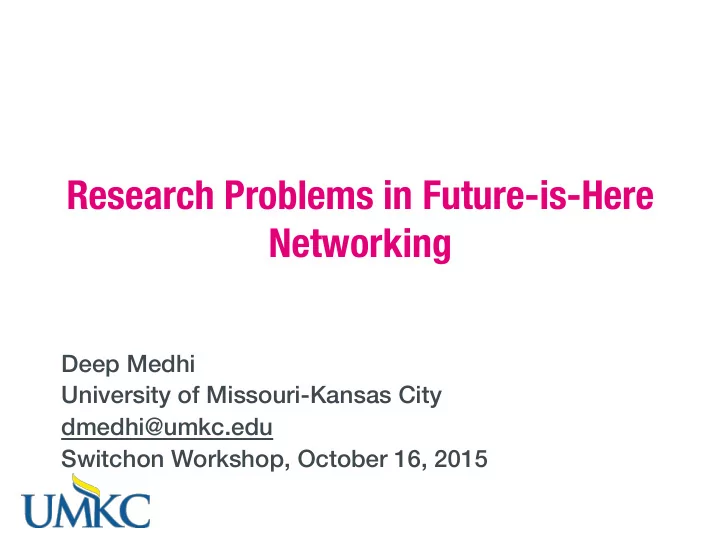

Research Problems in Future-is-Here Networking Deep Medhi � University of Missouri-Kansas City � dmedhi@umkc.edu � Switchon Workshop, October 16, 2015 �
International Activities • US-Japan Networking Research Collaboration � • Started in 2008 (as far as I know, this was the first one by National Science Foundation) � • A number of Workshops over the next few years � • Two joint US-Japan project solicitations � • 2009/2010: DCL (Dear Colleague Letter) � • 2013/2014: An Open Solicitation JUNO 13-574 � • http://www.nsf.gov/pubs/2013/nsf13574/nsf13574.htm � • Funded Project with Osaka City University � • Brazil’s Science Without Borders Program, 2013-2015 � • Host institution: University of Campinas � • Additional Collaborations: UFRGS, UFPR � • France: Université Pierre et Marie Curie (UPMC), 2014-current � • NSF SAVI travel Grant � • iMinds – University of Ghent, University of Antwerp, Belgium � • India: Indian Institute of Technology-Guwahati, India �
On-going Efforts • Software Defined Networking Scalability � • Software Defined Networking Availability � • Cloud Auditability: storing and mining event logs � • Resource allocation in multi-location, multi-location data center networks � • Time-Dependent � • Security-Enabled Traffic Engineering � • IoT and Cloud and how it impacts on Core Networks � • Hadoop in a hybrid cloud � • Resilient Networking for Massive Failures � • US Collaborations: � • US: University of Kansas, Arizona State University, Duke University �
End-to-end Resource Management for Highly Demanding Applications in Federated Wide-Area Environment Collaborations: � University of Antwerp, Belgium: Steven Latre � Federal University of Rio Grande do Sol (UFRGS), Porto Alegre, Brazil: Lisandro Z. Granville � University of Missouri-Kansas City (UMKC), USA �
Delivering content over a Managed IP Managed IP network Internet ¡ Customer ¡ Transit ¡ISP ¡ Access ¡ISP ¡ Managed ¡IP ¡ Content ¡Server ¡ QoS ¡Guarantees ¡ Yes ¡ Customer ¡Base ¡ Small ¡ Service ¡Types ¡ Limited ¡
Over Over-the-top -the-top (OTT) content delivery OTT ¡Provider ¡ OTT ¡ ? ¡ QoS ¡ No ¡ Guarantees ¡ Access ¡ISP ¡ Internet ¡ Customer ¡ Large ¡ Base ¡ Service ¡ Diverse ¡ Types ¡ Transit ¡ISP ¡
Federated managed service delivery Service ¡Provider ¡ Cloud ¡site ¡ Transit ¡ISP ¡ Dynamically ¡ deployed ¡ Access ¡ISP ¡ QoS ¡guaranteed ¡ functions ¡ Internet ¡ paths ¡ Cloud ¡site ¡ Cloud ¡site ¡
Federated vs. Traditional Content ¡Provider ¡ Content ¡Provider ¡ Transit ¡ISP ¡ Managed ¡IP ¡ OTT ¡ Federated ¡ Access ¡ISP ¡ QoS ¡Guarantees ¡ Yes ¡ No ¡ Yes? ¡ Internet ¡ Customer ¡Base ¡ Small ¡ Large ¡ Large ¡ Service ¡Types ¡ Limited ¡ Diverse ¡ Diverse ¡ Cloud-‑Based ¡ Storage ¡Site ¡
Prototype: worldwide deployment using GENI, FIRE, etc. Users Server provider Datacenter Kansas City, USA Antwerp, Belgium Porto Alegre, Brasil
Issues: • Understand the implication in really-wide area network, across continents. � • Application impact and rerouting: Lower level impact such as AS graph � • Federated Environment, where we have more control over each of the environment � • Understand coordination � • Network-aware Networking (NaN) � • Application Level characteristics for highly demanding applications � • Testbed setup �
Network Bandwidth Speed in a Data Center and its Impact Collaboration: � University of Campinas, Brazil: Edmundo Madeira � University of Missouri-Kansas City, USA �
IEEE 802.3: Bandwidth evolution (log scale)
Green Computing with Bw Evolution • Increased Network Speed = Faster VM Migrations ’ Times -> can reduce power consumption �
Impact on Makespan due to different scheduling algorithms • Impacts of Increased Network Speeds in Migrations, due to different scheduling algorithms
Impacts on Workloads with different scheduling algoritms
Impact on VM migration Sharp Decline Stabilization Peak # of Migrations
• Obtain further insight on the upper limit of the impact of increased bandwidth consumption of energy • And find the factors that determine where this upper limit is • Bandwidth-Aware VMs ’ Scheduling Algorithms • Topology-Aware Schemes • Data Center Federation
Acknowledgement • Students: � • Federated Networking: Pedro Isolani, Shuai (Jack) Zhao, Jeroen Famaey, Niels Soetens, Johan Bergs � • Network Speed and its impact: Daniel Lago (UNICAMP) � • Funding Agencies: � • National Science Foundation Grant # 0853414, 0960801, 0916505, 1029562, 1118231, 1217736, 1302040 � • CNPq for Science Without Borders’ Program �
Recommend
More recommend